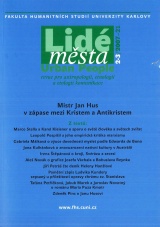K antropologické studii Leopolda Pospíšila o marxismu
DOI:
https://doi.org/10.14712/12128112.3753Abstrakt
Marxism as a philosophy of history, as well as an actual social program, has been of interest to humanities and social scientists since its emergence until today; for some it has become subject of criticism or rather menace of dangerous social changes, while others praised it as the only adequate understanding of hidden driving forces in history or at least as the most fitting explanation of social relationships in the framework of modern industrial society. In this connection, it is interesting to note that one of the first really scientific critiques of Marxism was written by T. G. Masaryk; it was in a time when “decent” academic society did not want to be bothered with Marxism because they considered it to be a priori “perverse” ideology useful, at most, to mobilize (unwillingly) the masses. Despite deepening social importance of Marxism that fortunately did not lead to its prevailing, this historical-philosophical theory served more as a leading ideological tool than tool for critical analysis. After the war, new disciplines appeared, such as Marxist historiography, sociology, or even theology, whose influence can be observed on all more distinct personalities of modern social sciences and humanities, while very few were ready to subject this “arm-chair Marxism“ to proper critique. Marxist thinking effected not just politics and the public domain, but became also an inherent part of academic discourse, at least by the protest counter-culture at the end on 1960s. Its power among students in revolutionary France of 1968 – and at the same time the way the ideological Marxism was accepted – was expressed aptly by the postulate saying that it is better to be wrong with (Marxist) Sartre than to be right with (rightist) Aron. Skeptics whose numbers were on the decrease, could derive their hope only from the notion of actual weakness and economic inefficiency of the Soviet governed world. However, there was a paradox highlighted in one of the essays by the Jewish writer Ephraim Kishon – while in the communist countries, belief in Marxism faded fast, in the West, it was (especially among intellectuals) unprecedentedly alive. It must be said that the Czech exiles who escaped the communist regime’s “achievements”– part of them left after February 1948, others at the end of 1960s, and than in 1980s – have not contributed much to this discussion. If they joined the fight against real socialist regimes at all, they mostly criticized their actual social and political practices, persecution of “dissidents” or of entirely innocent victims and other crimes that had nothing to do with the classless society ideal. Only very few attempted to look critically at the actual ideological foundations of socialism that was considered to be the scientific world view and subject it to a standard scientific critique. One of the few theoretical critics of Marxism was economist Josef Macek, another was anthropologist Leopold Pospíšil. In both of these cases it is important that these authors characterized Marxism as type of belief, religion with its rituals, prophets and canonic literature, keepers of dogma and trials of heretics. They would equally grumble against any other introduction of unscientific methods and postulates into scientific thinking, they also had to criticize not just the Marxist social practice, but also its foundations and the manner its modern dogmatic followers handled this originally interesting theory. This alone would be a sufficient reason to introduce the ageless Pospíšil’s study to a wider Czech public. However, it is not the only reason. After 1989, certain vulgar critique of Marxism took place in this country, but unfortunately only few extended their efforts to really refute this dangerous ideology. Author of the bellow published study is Leopold Jaroslav Pospíšil, born in Olomouc in April 26, 1923. After graduation from local high school, he left to study first medicine in Olomouc and then law at the Charles University in Prague. However, shortly before his graduation in 1948 he emigrated, because he was rightly afraid of persecution due to his rural origin and his political opinions. He was shortly employed as an agricultural worker in American mid-west. However, he was attracted to social sciences and he soon gave up farming and went to study sociology in Salem, social anthropology at a university in Eugene, Oregon, and thanks to his outstanding scholastic achievements he received a stipend to do his Ph.D. at Yale University in New Haven, where he graduated in 1956. During his anthropological studies and after his graduation, when he also started to lecture at this prestigious university, he undertook field research of Arizona Hopi Indians and Papuans of New Guinea. His research in Oceania focused primarily on the local legal systems and he became such a celebrity that in 1965 he was awarded a tenure at Yale University and became the Director of Peabody Museum of Natural History in New Haven.
Stahování
Publikováno
Jak citovat
Číslo
Sekce
Licence

Tato práce je licencována pod Mezinárodní licencí Creative Commons Attribution-NonCommercial-NoDerivatives 4.0.


